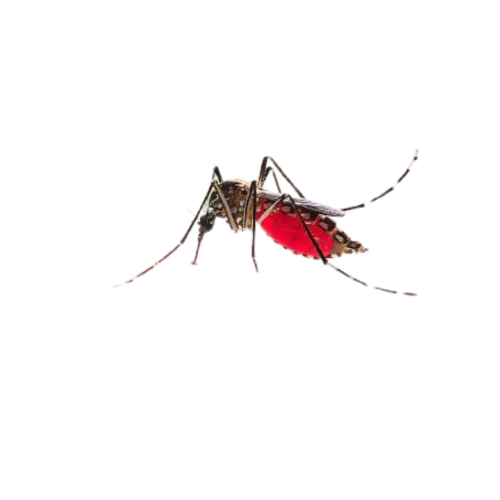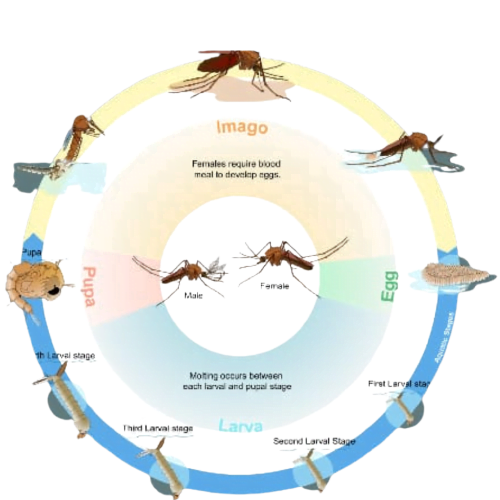How to manage Mosquitoes
Learn methods for identifying and managing mosquitoes to protect your health.

Understanding Mosquito Behavior
Mosquitoes belong to the Diptera order, and it is believed that there are around 3500 species worldwide. These insects are scientifically known as Culicidae and have slender bodies with two wings and long, thin legs. They are highly adaptable to various environments. Mosquitoes are notorious for spreading dangerous diseases to humans, including dengue, malaria, and the Zika virus, which can even cause death.
Their preferred breeding grounds are stagnant water sources, providing a suitable spot for female mosquitoes to lay eggs.Interestingly, only female mosquitoes bite, as they need blood to lay eggs. In contrast, male mosquitoes feed on nectar and other plant juices. To eliminate mosquitoes from your space, it is essential to keep your surroundings clean and free from potential breeding spots. However, sometimes cleaning alone may not be sufficient to get rid of these pesky insects. This is where the role of a professional pest control service comes into play.

Life Cycle of Mosquitoes
The mosquito’s lifecycle comprises four stages: egg, larva, pupa, and adult. Eggs are laid in water and hatch into larvae. After pupation, the larvae transform into pupae before emerging as fully developed adults.
Once the eggs hatch, the mosquito larvae, known as wrigglers, begin their lives in the water. They get their name due to their characteristic wriggling movements.These larvae breathe through an air tube called a siphon and feed on organisms present in the water.
Upon entering the pupal stage, the mosquito takes on a comma-like shape, a phase that lasts only a few days. Interestingly, they do not require any food during this stage.
After completing metamorphosis, the pupae transform into adult mosquitoes and rest on the water surface. Once they are fully developed and capable of flight, they begin the search for a mate.
Types of Mosquitoes

Diseases like dengue and chikungunya are spread by these mosquitoes. They are easily recognizable by their black and white stripes on their bodies. Aedes mosquitoes commonly breed in stagnant water.
Aedes Mosquitoes:
Anopheles mosquitoes are known for spreading malaria, a serious disease that can be fatal to humans. They have elongated proboscis, making them unique, and are active during nighttime.
Anopheles Mosquitoes:
Psorophora mosquitoes are well-known for their painful bites, causing rashes on the body. They are larger and darker compared to other mosquito species, and their attacks can happen at any time.
Psorophora Mosquitoes:
These mosquitoes are small in size and prefer to breed in natural habitats. Unlike other species, they are not dangerous for spreading diseases.
Uranotaenia Mosquitoes:Overcoming Mosquito infestation
Mosquitoes, those tiny buzzing insects, pose a significant threat to human health, carrying deadly diseases and causing discomfort with their incessant bites. Addressing this menace requires professional intervention, as their breeding spots can be elusive and eliminating them permanently demands expertise. One such reliable solution is Al Rasa pest control services in Dubai, renowned for their effective mosquito control measures, ensuring a pest-free environment for all. With a team of experienced professionals, they understand the behavior and habits of mosquitoes, enabling them to identify breeding spots that would otherwise go unnoticed. Their integrated pest management approach ensures not only the eradication of existing mosquito populations but also the prevention of future infestations.
Frequently Asked Questions
Mosquito infestations are mainly caused by standing water, which provides a favorable breeding environment for them.
- Regularly empty standing water sources around your home.
- Keep your living areas and surroundings clean and well-maintained.
- Use net screens on windows and doors to prevent their entry.
No, only a few species like Aedes and Anopheles mosquitoes can carry and transmit diseases.
For severe infestations, it is best to seek the assistance of a professional pest control service. They have the expertise and appropriate measures to effectively tackle the issue.
The peak mosquito season varies by region, but in general, it occurs during warm and humid months when their breeding activity increases.
Some interesting and informative facts about Mosquitoe
- Malaria is one of the deadly diseases spread by mosquitoes.
- Mosquitoes have a relatively short lifespan, usually lasting only a few weeks.
- Some mosquito species are active both day and night, while others are only active during the night.
- The buzzing sound produced by mosquitoes is made by their wings, which can flap up to 500 times per second.
- Mosquito saliva contains an anticoagulant that prevents blood clotting during feeding.
- Birds and dragonflies are some of the predators that prey on mosquitoes.

Female mosquitoes lay eggs in standing water or stagnant containers, with each female capable of laying around 100 eggs at a time. These tiny eggs remain on the water surface until they hatch, a process that takes a few days.